1. Overview
Marc-André Fleury, born on November 28, 1984, is a Canadian professional ice hockey goaltender who currently plays for the Minnesota Wild of the National Hockey League (NHL). Known by the nickname "Flower," derived from the English translation of his last name (fleuri means "in bloom" or "in flower" in French), Fleury has established himself as one of the most accomplished goaltenders in the sport's history. His career trajectory, from being the first overall pick in the 2003 NHL Entry Draft by the Pittsburgh Penguins to his tenures with the Vegas Golden Knights and Chicago Blackhawks, has been marked by significant team and individual successes.
Fleury is a three-time Stanley Cup champion with the Penguins (2009, 2016, 2017) and an Olympic gold medalist with Team Canada at the 2010 Winter Olympics in Vancouver. His individual accolades include the William M. Jennings Trophy and the Vezina Trophy, both earned in 2021. He is the third goaltender in NHL history to achieve 500 career victories, following only Patrick Roy and Martin Brodeur, and the fourth to play 1,000 games, joining Roy, Brodeur, and Roberto Luongo. As of 2023, Fleury remains the last active goaltender who played in the NHL before the 2004-05 NHL lockout, a testament to his longevity and enduring impact on the league. Fleury's public actions, such as his defiance of the NHL's mask policy in support of Indigenous heritage, highlight his personal integrity and consideration for minority perspectives, aligning with broader values of social progress and human rights.
2. Early Life and Junior Career
Marc-André Fleury's journey in ice hockey began in his hometown of Sorel-Tracy, Quebec, laying the foundation for a distinguished professional career.
2.1. Childhood and Hockey Beginnings
Fleury was born to André and France Fleury in Sorel-Tracy, Quebec, a town situated near Montreal. He has one younger sister, Marylène. As a youth, he participated in the 1998 Quebec International Pee-Wee Hockey Tournament as a member of the College-Français Rive-Sud minor ice hockey team from South Shore, Montreal.
His junior ice hockey career began in the Quebec Major Junior Hockey League (QMJHL) with the Cape Breton Screaming Eagles during the 2000-01 QMJHL season. Following a strong 2002-03 QMJHL season that saw him earn World Junior Championship silver with Team Canada and QMJHL Second Team All-Star honors, Fleury was selected as the first overall pick in the 2003 NHL Entry Draft by the Pittsburgh Penguins. The Penguins secured this top pick from the Florida Panthers in a trade that involved the Penguins sending the third and 55th overall picks, along with Mikael Samuelsson, to the Panthers in exchange for the first and 73rd overall picks. Fleury became only the third goaltender in NHL draft history to be chosen first overall, following Michel Plasse and Rick DiPietro. During his time in the QMJHL, Fleury received both the Mike Bossy Trophy as the league's top prospect and the Telus Cup as the top defensive player in 2003. After playing four seasons with Cape Breton, his jersey number 29 was retired by the club on January 25, 2008, during his fourth NHL season.
3. Professional Career
Marc-André Fleury's professional career spans over two decades, marked by significant achievements and changes of scenery across multiple NHL franchises.
3.1. Pittsburgh Penguins (2003-2017)
Fleury made an immediate impact, debuting in the NHL during the 2003-04 NHL season as the league's youngest goaltender at 18 years old. His first NHL game on October 10, 2003, against the Los Angeles Kings, saw him make an impressive 46 saves, including a penalty shot stop, despite a 3-0 loss. He recorded his first NHL win in his very next start on October 18, with 31 saves in a 4-3 victory over the Detroit Red Wings, and his first NHL shutout came on October 30 in a 1-0 win against the Chicago Blackhawks. Sharing time with goaltenders Jean-Sébastien Aubin and Sébastien Caron, Fleury met early expectations by earning Rookie of the Month honors in October with a 2-2-2 record, a 1.96 goals against average (GAA), and a .943 save percentage. However, his performance subsequently declined, largely attributed to Pittsburgh's weak defense, which often conceded over 30 shots per game while struggling offensively.
He was loaned to Team Canada for the 2004 World Junior Ice Hockey Championships in December. After returning with a second consecutive silver medal, he was controversially sent back to the QMJHL on January 29, 2004. This decision was largely influenced by the Penguins' financial difficulties, as Fleury's contract included a potential 3.00 M USD bonus if he met certain performance goals, which the struggling franchise was keen to avoid. Fleury even offered to forfeit his bonus to remain with the NHL club, but the decision stood. He finished the QMJHL season with Cape Breton before being assigned to the Penguins' American Hockey League (AHL) affiliate, the Wilkes-Barre/Scranton Penguins, for two postseason games.
During the NHL lockout, Fleury continued to play for Wilkes-Barre/Scranton in the 2004-05 AHL season, where he posted a 26-19-4 record, a 2.52 GAA, and a .901 save percentage. When NHL play resumed in the 2005-06 NHL season, he briefly started in the minors but was quickly recalled by Pittsburgh on October 10, 2005, to replace an injured Jocelyn Thibault. He continued to split time between the AHL and NHL until November 28, after which he remained with Pittsburgh. The Penguins finished last in the Eastern Conference, allowing a league-worst 316 goals, and Fleury recorded a 3.25 GAA and a .898 save percentage. Despite the team's struggles, he emerged as the Penguins' starting goaltender, competing with Sébastien Caron and Jocelyn Thibault for playing time.
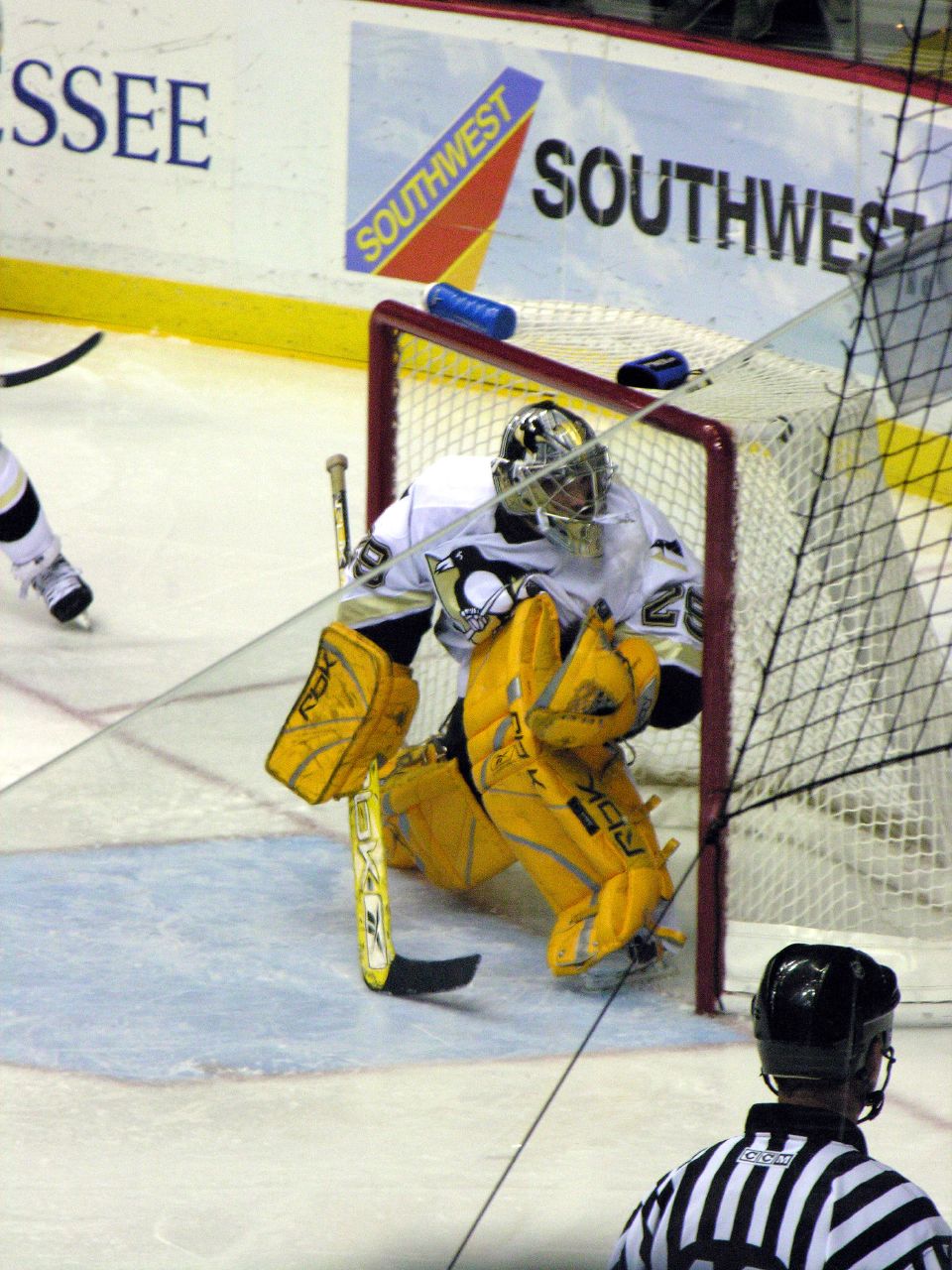
Despite a shaky defense, Fleury impressed management with his technique and performance, leading to a two-year contract extension worth 2.59 M USD in the off-season. In the following season, his statistics significantly improved as the Penguins' team strengthened with rising superstars Sidney Crosby and Evgeni Malkin. He recorded five shutouts and a 2.83 GAA. His 40th win in a 2-1 victory over the New York Rangers in the season finale made him only the second Penguins goaltender, alongside Tom Barrasso, to achieve 40 wins in a season. He also surpassed Johan Hedberg's franchise record for most games and minutes played in a single season. Fleury made his NHL playoff debut against the Ottawa Senators in the first round, recording his first playoff win in Game 2 with 34 saves in a 4-3 victory.
The 2007-08 NHL season started slowly for Fleury, but he won four consecutive games before suffering a high-ankle sprain against the Calgary Flames on December 6. He returned as a starter on March 2, after a conditioning stint in the AHL. While sidelined, he changed his goaltending equipment color from his signature bright yellow to plain white for an optical advantage. He was also pushed by the strong play of Ty Conklin, who had taken the starting job during his absence. Upon his return, Fleury helped the Penguins win the Atlantic Division, posting a 10-2-1 record with a 1.45 GAA. This led to a 12-2 playoff run to the 2008 Stanley Cup Finals against the Detroit Red Wings. In Game 5 of the Finals, Fleury made 55 saves on 58 shots in a triple overtime win, preventing elimination. Though the Penguins lost the series in six games, Fleury's attempt to cover a loose puck by sitting on it in Game 6 inadvertently propelled it into the net, resulting in an own goal credited to Henrik Zetterberg that became the Stanley Cup-winner. Reflecting on the incident at the start of the next season, Fleury stated, "I'm done with it. I swore enough about it. Nothing I can do anymore. I don't think we lost the finals on one goal, you know what I mean? I feel bad because I kind of put it in, but it was a best-out-of-seven. They had a good team, and they beat us." He concluded the playoffs with three shutouts, a new team record for a single postseason, and a 14-6 record, along with a leading .933 save percentage. In the off-season, on July 3, he signed a seven-year, 35.00 M USD contract with the Penguins, which included a no-movement clause and a limited no-trade clause that became active in the 2010-11 NHL season.

In the 2008-09 NHL season, Fleury posted a 35-18-7 record, helping the Penguins secure a fourth-place finish in the Eastern Conference and enter the 2009 Stanley Cup playoffs as defending Prince of Wales champions. He was a crucial factor in the first-round series against the Philadelphia Flyers. In Game 2, with Pittsburgh trailing 2-1 late in the third period, Fleury made a vital toe save against Jeff Carter, which proved pivotal as the Penguins tied the game and won in overtime. In Game 4, he stopped 43 shots to hold off a surging Flyers lineup, securing a 3-1 series lead. After the Flyers won Game 5, Fleury delivered another strong performance in the final period of Game 6. After initially conceding three goals, he allowed no more as the Penguins rallied from a 3-0 deficit to win 5-3. The Penguins faced the Washington Capitals in a full seven-game series in the second round. In the deciding Game 7, Fleury made a critical breakaway glove save early against superstar Alexander Ovechkin, enabling the Penguins to eliminate Washington with a 6-2 score. Fleury and the Penguins then swept the Carolina Hurricanes in the Conference Finals, advancing to the 2009 Stanley Cup Finals for a second consecutive year, once again facing the Detroit Red Wings. After being pulled in Game 5 after allowing five goals, Fleury made another monumental save in Game 6, this time with 1:39 remaining in regulation against Dan Cleary, preserving a 2-1 lead and forcing a Game 7. Playing the series-deciding game in Detroit, Fleury was integral to the Penguins' 2-1 victory, making two critical saves in the final seconds against Henrik Zetterberg and Nicklas Lidström to clinch the franchise's third Stanley Cup. This heroic performance dispelled any remaining doubts about his big-game ability.
Fleury recorded a 37-21-6 record during the 2009-10 NHL season, as the defending Stanley Cup champions finished fourth in the Eastern Conference. After dispatching the Ottawa Senators in six games in the first round, the Penguins were upset by the eighth-seeded Montreal Canadiens in the second round, ending their hopes for a Stanley Cup repeat. Game 7 of this series marked the final game played at the Mellon Arena. Fleury recorded a 2.78 goals against average during the playoffs.
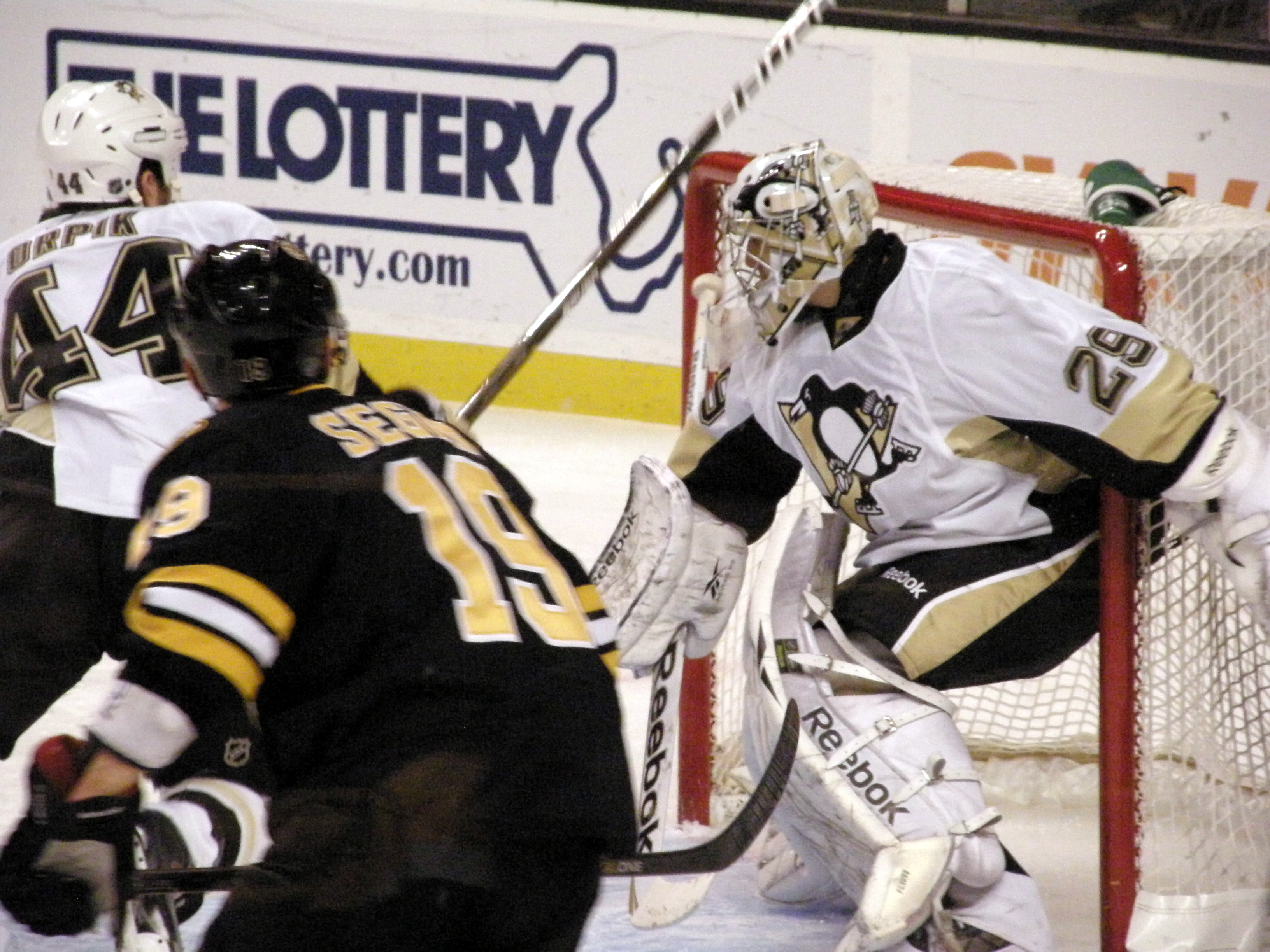
With key players Sidney Crosby and Evgeni Malkin sidelined with injuries for much of the 2010-11 season, Fleury and the Penguins' defense were heavily relied upon to carry the team to the playoffs. Fleury finished the season with a 36-20-5 record, with the Penguins finishing fourth in the Eastern Conference. They faced the Tampa Bay Lightning in the first round of the playoffs, where they were surprisingly defeated in seven games despite having taken an early 3-1 series lead. Fleury posted a .899 save percentage in the series.
Backup goalies Brent Johnson and Brad Thiessen struggled through much of the 2011-12 season, making Fleury the primary goaltending option. He played 67 games, starting 23 consecutive games leading up to the All-Star break, and finished the season with 42 wins, second only to Pekka Rinne of the Nashville Predators. Despite an impressive regular season, Fleury had a less impactful playoff run, as the Penguins were eliminated by the Philadelphia Flyers in the first round in six games. He posted a .834 save percentage and a 4.63 goals against average in that series.
After the lockout-shortened season, Fleury returned strongly in the 2012-13 NHL season, putting up some of the best numbers of his career. He finished with a record of 23-8, tying him for fourth in the league in wins, while his save percentage and goals against average ranked him in the top half of starting goaltenders. However, his playoff troubles continued; after a shutout in his first playoff game, his subsequent performances were inconsistent, leading backup Tomáš Vokoun to start for the remainder of the 2013 playoffs. The Penguins' promising season ended abruptly with a 4-0 loss to the Boston Bruins in the Eastern Conference Finals. Despite this, Penguins officials confirmed after the season that Fleury remained the team's starting goaltender.
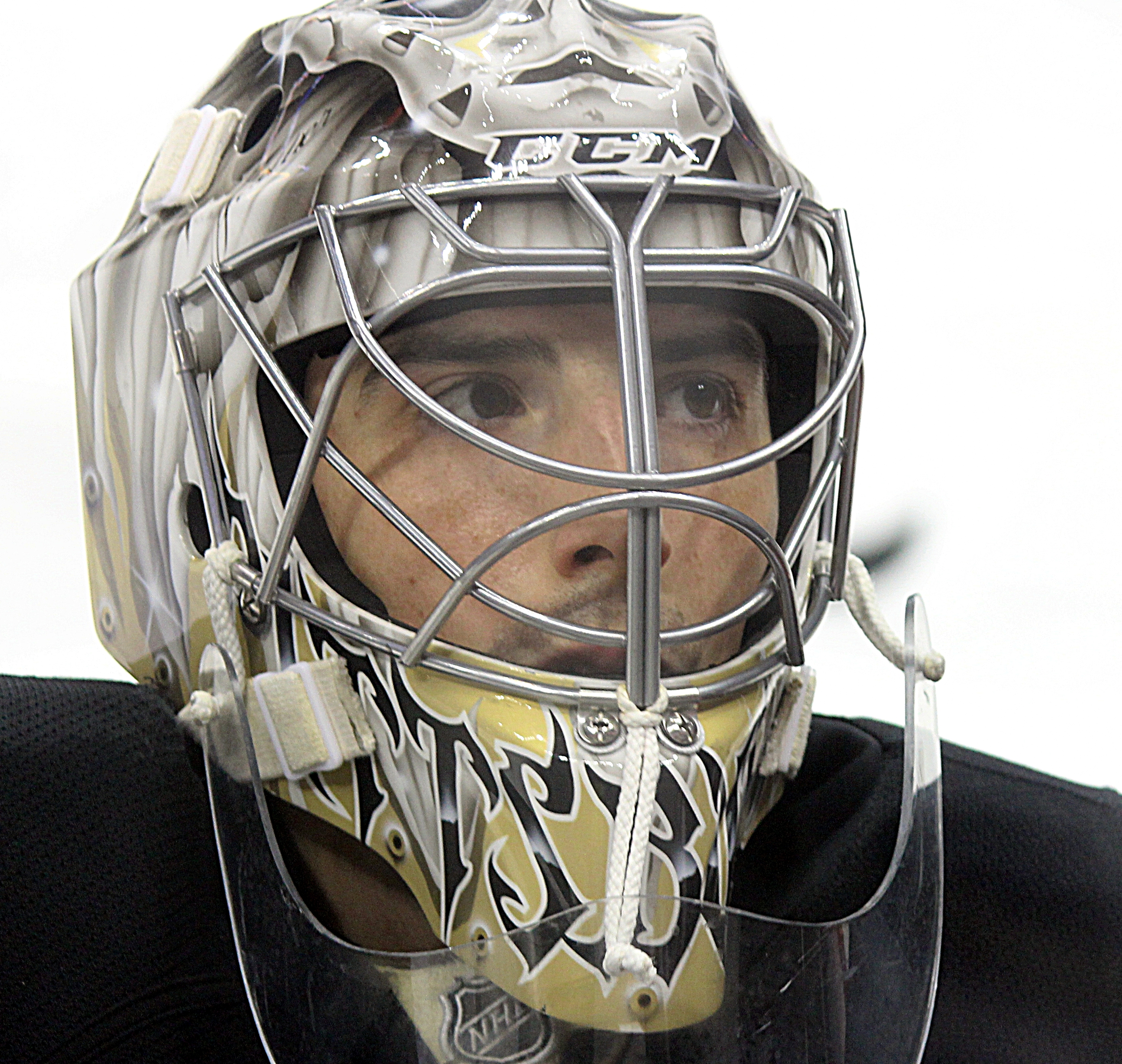
Fleury's performance during the 2013-14 NHL season was consistent with the prior year. He finished with a record of 39-18-5, a .915 save percentage, and a 2.37 goals against average. Despite a notable improvement in his playoff performance compared to the previous year, the Penguins lost in the second round to the New York Rangers, despite initially holding a 3-1 series lead.
On November 5, 2014, the Penguins signed Fleury to a four-year contract extension with an average annual value of 5.75 M USD. On November 18, 2014, he recorded his first shutout against the Montreal Canadiens, making 27 saves for a 4-0 victory, marking his league-leading fourth shutout of the season. Six days later, on November 24, 2014, Fleury achieved his 300th NHL win, becoming the third-youngest and third-fastest player to reach this milestone. On April 11, he secured his league-leading tenth shutout in a 2-0 victory against the Buffalo Sabres, which helped the Penguins clinch the final wild card spot in the Eastern Conference.
In the 2015-16 NHL season, the team struggled during the first half, leading to the firing of head coach Mike Johnston and the hiring of Mike Sullivan. Fleury had a strong second half before suffering a season-ending concussion. He concluded the season with an impressive 35 wins in 58 games. The team made a final push for the playoffs with up-and-comer Matt Murray in goal.
Despite the Penguins qualifying for the 2016 Stanley Cup playoffs, Fleury was unable to play due to post-concussion syndrome until Game 4 of the Eastern Conference Final against the Tampa Bay Lightning, where he replaced Murray at the start of the third period. Fleury then started Game 5, which the Penguins lost 4-3 in overtime, and was subsequently benched in favor of Murray. The Penguins ultimately won the Stanley Cup with Murray in goal, defeating the San Jose Sharks in six games.
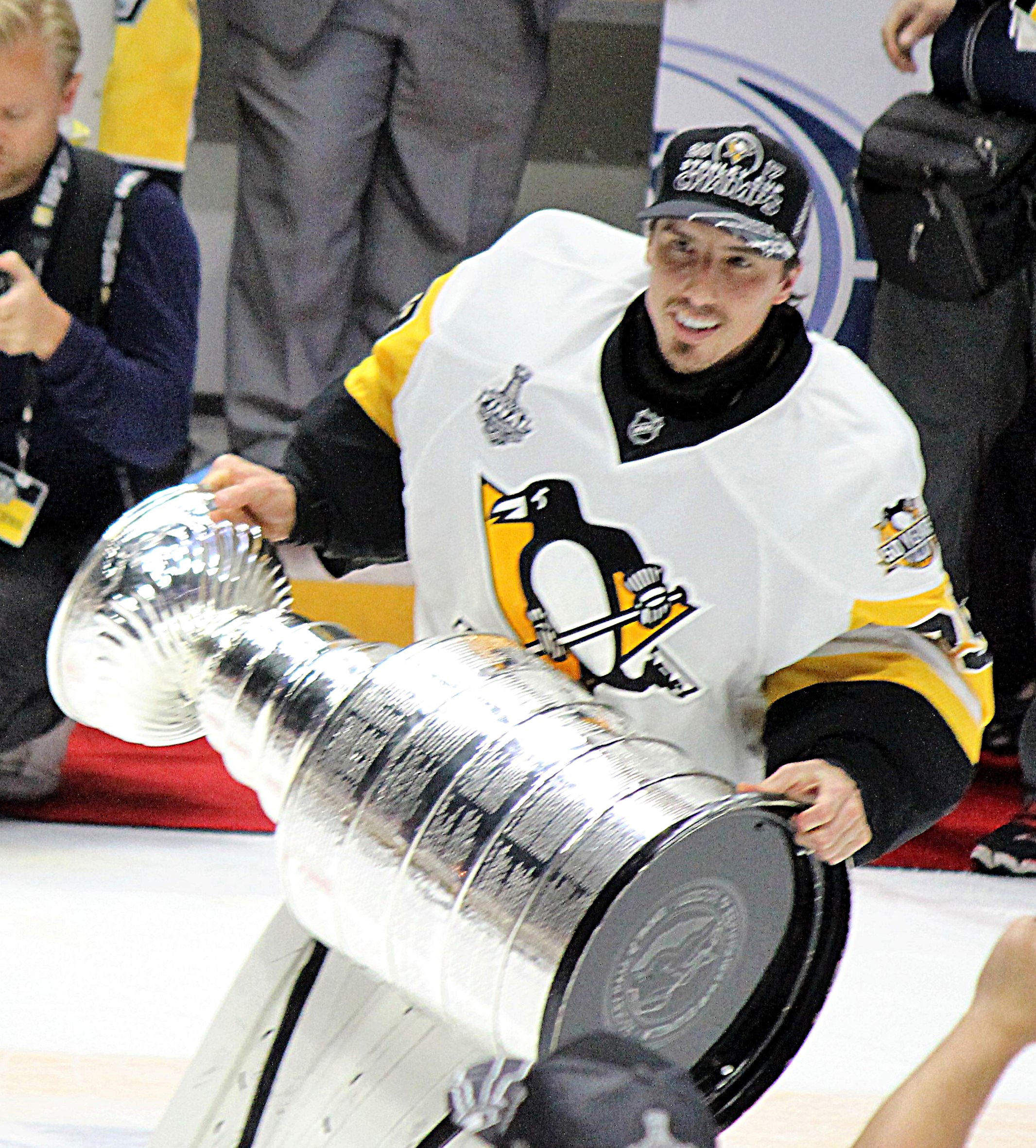
In the 2016-17 NHL season, Fleury played 38 games and accumulated 18 wins. When Matt Murray was injured during warm-ups for Game 1 of the playoffs against the Columbus Blue Jackets, Fleury took the starting position and led the Penguins to a 3-1 victory. He continued to lead the Penguins through the series, with his 49 saves on 51 shots in Game 5 helping Pittsburgh win the series against the Blue Jackets 4-1. With Murray still sidelined, Fleury remained the starter for the Penguins through the second round against the back-to-back Presidents' Trophy-winning Washington Capitals. The Penguins defeated the Capitals for the second consecutive time, this time in seven games, with Fleury shutting them out in Game 7, and advanced to face the Ottawa Senators in the Eastern Conference Finals. Following a 5-1 loss in Game 3, the Penguins opted to start a healthy Murray, who remained the team's starter en route to another Stanley Cup championship victory, defeating the Nashville Predators in six games. This marked the third Stanley Cup of Fleury's career.
3.2. Vegas Golden Knights (2017-2021)
On June 21, 2017, due to the emergence of Matt Murray as the Penguins' primary goaltender, Fleury willingly waived his no-trade and no-movement clauses to be left exposed for the 2017 NHL Expansion Draft. He was subsequently selected by the new franchise, the Vegas Golden Knights. As an incentive for Vegas to select Fleury and relieve Pittsburgh of his nearly 6.00 M USD cap hit, the Penguins also traded their second-round pick in the 2020 NHL Entry Draft to the Golden Knights. Fleury immediately made his mark, stopping 45 of 46 shots in the Golden Knights' inaugural NHL game, a 2-1 victory over the Dallas Stars.
On October 15, 2017, Fleury was placed on Long Term Injury Reserve (LTIR) after suffering a knee to the head from Anthony Mantha of the Detroit Red Wings two days earlier. He missed 25 games and was activated off LTIR on December 10, 2017. Despite the injury, Fleury was chosen to represent Las Vegas at the 2018 NHL All-Star Game. During the All-Star Weekend, he won the inaugural Save Streak competition by saving 14 consecutive shootout attempts. On March 12, 2018, against the Philadelphia Flyers, Fleury earned his 400th career win in a 3-2 victory.
Fleury was the starting goaltender for the Golden Knights during the 2018 Stanley Cup playoffs. On April 17, 2018, the Golden Knights completed a 4-0 sweep of the Los Angeles Kings in the first round, marking the franchise's first-ever playoff series win. On May 6, after Fleury posted a shutout, the Golden Knights advanced to the Western Conference Finals by defeating the San Jose Sharks in Game 6 of their series. On May 20, 2018, Fleury led the Golden Knights to a victory over the Winnipeg Jets in the Western Conference Finals, earning him a shot at a fourth Stanley Cup. His strong play during the playoffs even inspired a Vegas casino to create a chocolate sculpture of him performing a butterfly save. Fleury was in net for every game of the Knights' five-game loss to the Washington Capitals in the 2018 Stanley Cup Finals.
In the 2018 off-season, Fleury re-signed with the Golden Knights on a three-year, 21.00 M USD contract. Nearly halfway through the 2018-19 NHL season, Fleury led the NHL in wins (27) and shutouts (6) across 45 games, which led to his second consecutive selection to represent the Golden Knights at the 2019 NHL All-Star Game. In Game 7 of Las Vegas's first-round playoff series against the San Jose Sharks, Fleury and the Golden Knights conceded four goals in four minutes after a controversial five-minute major penalty was assessed to Cody Eakin for cross-checking Sharks' forward Joe Pavelski. The Golden Knights ultimately lost Game 7 and the series to the Sharks.
With Vegas struggling to find a stable backup goaltender, Fleury was frequently overplayed during the 2019-20 NHL season, posting a 2.77 goals against average and a .905 save percentage. Vegas eventually acquired Robin Lehner during the season, allowing Fleury to share the net in a tandem. Fleury played sparingly during the 2020 Stanley Cup playoffs, largely serving as Lehner's backup as the Golden Knights again reached the conference finals, losing to the Dallas Stars in five games.
The pandemic-shortened 2020-21 NHL season saw a resurgence in Fleury's performance. At 36 years old, he recorded career-best statistics with a 1.98 goals against average and a .928 save percentage, helping the Golden Knights make their third "final four" appearance in four seasons. In Game 3 of the semifinals against the Montreal Canadiens, Fleury misplayed the puck behind his net, allowing Josh Anderson to tie the game with 1:55 left in regulation before Anderson scored the overtime winner, giving the Canadiens a 2-1 series lead. As a result, Lehner started in net for the Golden Knights in Game 4, which they won in overtime to even the series at 2. Fleury returned in Game 5, but the Golden Knights lost 4-1, giving the Canadiens a 3-2 series lead. Lehner played in Game 6, which the Canadiens won in overtime to eliminate the Golden Knights and advance to the 2021 Stanley Cup Finals. At the conclusion of the season, Fleury was named to the Second All-Star Team and awarded his first Vezina Trophy as the league's best goaltender and his first William M. Jennings Trophy for combining with Lehner to allow the fewest goals.
3.3. Chicago Blackhawks (2021-2022)
On July 27, 2021, the Golden Knights, needing to create salary cap space, traded Fleury to the Chicago Blackhawks in exchange for minor league forward Mikael Hakkarainen. This made Fleury the first goaltender since Dominik Hašek to be traded as the reigning Vezina Trophy winner. Both Fleury and his agent, Allan Walsh, stated that they were not notified by the Golden Knights about the trade and learned about it via Twitter, which caused significant distress. Following the trade, Fleury reportedly contemplated retirement. However, on August 1, Fleury announced his intention to play for the Blackhawks in the 2021-22 NHL season.
The Blackhawks began the season with a historically poor 0-7-2 start, which eventually led to the firing of coach Jeremy Colliton. Fleury recorded his first win as a Blackhawk on November 1, 2021, in a 5-1 victory against the Ottawa Senators. On December 9, Fleury achieved his 500th NHL win in a shutout against the Montreal Canadiens, becoming only the third goaltender in NHL history to reach this milestone, joining Patrick Roy and Martin Brodeur. On January 8, 2022, Fleury made history again by becoming the first goaltender in the NHL to defeat all 32 teams when the Blackhawks won against his former team, the Vegas Golden Knights.
With the Blackhawks struggling and pivoting into a team rebuild, the possibility of trading Fleury became a subject of intense speculation leading up to the 2022 trade deadline, given his elite reputation and expiring contract. Any such trade was complicated by a gentlemen's agreement that former Blackhawks general manager Stan Bowman had made with Fleury to convince him not to retire, which stated that he would not be traded without his consent. New general manager Kyle Davidson publicly committed to honoring that arrangement. For his part, Fleury openly stated, "If I move, I would love a chance to win. That's what I play for, and that's what I love. But it's still a big 'if' at this point."
3.4. Minnesota Wild (2022-present)
On March 21, 2022, Fleury was traded to the Minnesota Wild in exchange for a conditional 2022 second-round pick. This pick would elevate to a first-round pick if the Wild reached the 2022 Western Conference Final and Fleury won four games in the process. The Wild's general manager, Bill Guerin, was a former teammate of Fleury's on the Penguins, establishing a connection that facilitated the move. Fleury made his debut with the Wild in a March 26 game against the Columbus Blue Jackets, backstopping them to a 3-2 overtime victory. After the game, a fan threw a bouquet of flowers onto the ice, a gesture Fleury noted was a first in his career.
Fleury recorded a 9-2-0 record with a .910 save percentage in 11 regular season games with the Wild. With the team's other goaltender, Cam Talbot, also performing strongly (an 8-0-3 record with a .925 save percentage since Fleury's arrival), there was debate about who would start the first round of the Stanley Cup playoffs against the St. Louis Blues. Ultimately, Fleury was given the nod. With Fleury in net, the Wild initially took a 2-1 series lead but then lost the fourth and fifth games, facing elimination in Game 6. Fleury was replaced by Talbot in Game 6, but the Wild were eliminated by the Blues, four games to two.
On July 7, 2022, Fleury chose to forgo free agency and signed a two-year, 7.00 M USD contract extension to remain with the Wild. The Wild's decision to extend Fleury led to a conflict with Talbot, who was subsequently traded to the Ottawa Senators in exchange for Filip Gustavsson. In the 2022-23 NHL season, on October 30, Fleury earned his 62nd shootout win in a game against the Blackhawks, becoming the leader in NHL career shootout wins. Throughout much of the middle of the season, Gustavsson outperformed Fleury, leading to speculation about who would serve as the team's primary starter. Fleury himself acknowledged his struggles, assessing that he had "been in my head probably too much." However, his play improved as the Wild entered March, embarking on a lengthy points streak.
On December 31, 2023, Fleury played his 1,000th NHL game, becoming just the fourth goaltender in league history to reach this milestone. On January 15, 2024, Fleury became the second-winningest goaltender in NHL history after earning his 552nd win in the Wild's 5-0 victory against the New York Islanders, surpassing Patrick Roy on the all-time wins list. On April 9, 2024, the Wild were eliminated from playoff contention, which ended Fleury's remarkable 17-year consecutive playoff appearance streak, as he had last missed the playoffs with Pittsburgh in 2006. On April 17, 2024, he signed a one-year, 2.50 M USD extension with the Wild, and has stated his intention to retire at the end of the 2024-25 NHL season.
4. International Play
Marc-André Fleury has proudly represented Canada on the international stage at various levels, earning medals in junior championships and an Olympic gold.
He earned two silver medals with Team Canada at the IIHF World Junior Championships. His first appearance was in 2003 in Halifax. Despite Canada's 3-2 defeat to Russia in the gold medal game, Fleury distinguished himself with a 1.57 GAA and was named both the Top Goaltender and the tournament MVP.
Even though Fleury was playing in the NHL in the lead-up to the 2004 World Junior Ice Hockey Championships, the Pittsburgh Penguins loaned him to Team Canada. Fleury had expressed a desire to remain with his NHL club, but Penguins management believed the high-profile tournament would benefit his development. He led Team Canada to the gold medal game for the second consecutive year. However, he made a costly mistake in the final against Team USA that ultimately cost his team the championship. With the game tied 3-3 and less than five minutes remaining in regulation, Fleury left his net to play the puck and thwart a breakaway opportunity for Patrick O'Sullivan. His clearing attempt, however, inadvertently struck his own defenseman, Braydon Coburn, and trickled into the net. This own goal proved to be the decisive factor, as the Americans held on for a 4-3 victory.
On December 30, 2009, Fleury was named to Team Canada for the 2010 Winter Olympics in Vancouver. Although he did not play in the tournament, as the goaltending duties were split between Martin Brodeur and Roberto Luongo, he still received a gold medal as Canada defeated the United States 3-2 in the final.
5. Playing Style
Marc-André Fleury is renowned for his adoption of the butterfly style of goaltending, a technique he executes effectively, particularly demonstrating the principles of the Quebec style developed by François Allaire. This style involves the goaltender dropping to their knees with their pads flared out to cover the lower part of the net, forcing shooters to aim high. A distinctive feature of Fleury's equipment throughout much of his career has been his preference for white leg pads, catcher, and blocker, which he adopted to gain an optical advantage over shooters by creating a larger, less defined visual presence in the net.
6. Personal Life
Marc-André Fleury's personal life offers insights into his family background, relationships, and notable public stances.
Born to André and France Fleury in Sorel-Tracy, Quebec, Fleury has a younger sister named Marylène. Early in his NHL career, after being drafted by the Pittsburgh Penguins, he briefly resided with hockey legend Mario Lemieux while seeking more permanent living arrangements.
In 2012, Fleury married his longtime girlfriend, Véronique Larosee. The couple has two daughters and a son, Carson Swain, who was born on March 22, 2019, weighing 9.3 lb (9.3 lb) and measuring 21 in. Véronique Larosee is of Abenaki and Mi'kmaq descent, representing Indigenous heritage. In November 2023, a significant event occurred when the NHL prohibited Fleury from wearing a custom mask he had commissioned to honor his wife's Indigenous heritage during his team's Native American Heritage Night. In a courageous act of solidarity and defiance, and despite the threat of fines for both himself and the team, Fleury chose to wear the special helmet during warm-ups, sending a powerful message of support for Indigenous communities and advocating for cultural recognition, even though he did not start the game.
Fleury is widely known by his affectionate nickname "Flower," which is derived from the English translation of his French last name; fleuri translates to "in bloom" or "in flower." His goaltender masks consistently feature a fleur-de-lis on the backplate, a traditional French symbol, along with the initials EFGT, honoring his four grandparents in memoriam. Additionally, his mask designs have frequently incorporated various floral artwork on the front, further embracing his "Flower" persona.
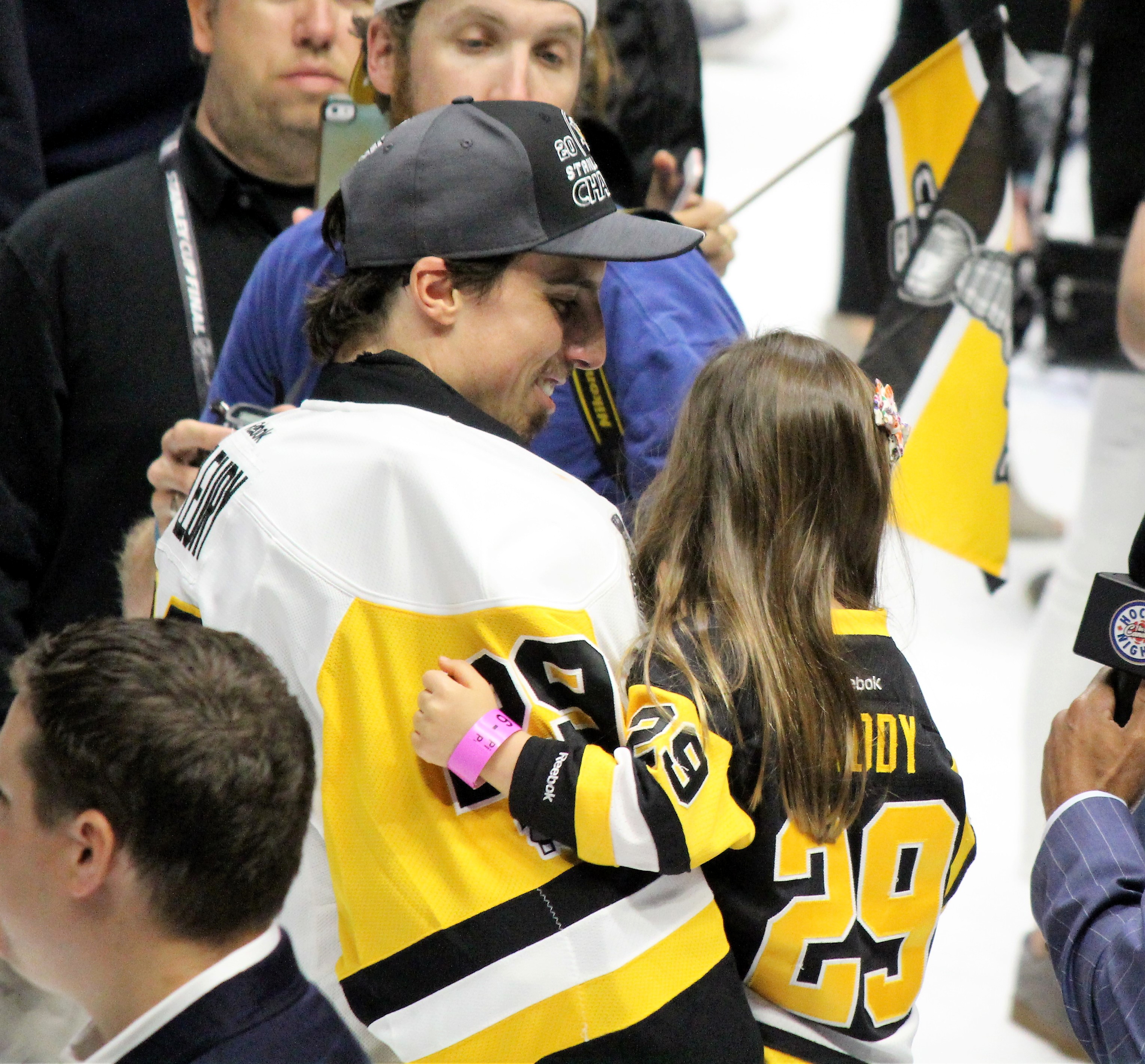
7. Achievements and Legacy
Marc-André Fleury's career is marked by an impressive array of achievements and statistical milestones that solidify his legacy as one of the greatest goaltenders in NHL history. His three Stanley Cup championships with the Pittsburgh Penguins (2009, 2016, 2017) are testament to his ability to perform under pressure and contribute to team success at the highest level.
Individually, Fleury's longevity and consistency are highlighted by his remarkable statistical accomplishments. He is one of only three goaltenders in NHL history to reach 500 career victories, a feat accomplished on December 9, 2021, and became the second-winningest goaltender in league history on January 15, 2024, by earning his 552nd win. His 1,000th NHL game on December 31, 2023, placed him among an exclusive group of only four goaltenders to reach that mark.
Fleury's personal accolades include the Vezina Trophy and the William M. Jennings Trophy, both earned in 2021, recognizing his excellence in goaltending and team defensive play. He has been a multiple-time NHL All-Star and was recognized on the NHL's All-Decade First Team for the 2010s. Beyond the statistics, his impactful saves in critical playoff moments, such as his last-second heroics in Game 7 of the 2009 Stanley Cup Finals, are etched into hockey lore. His consistent dedication, leadership, and resilient play have made him a beloved figure across the league, leaving an indelible mark on the sport. His willingness to take a stand for Indigenous heritage by wearing a specially designed mask, despite NHL policy, further distinguishes him as a figure committed to broader societal values beyond the rink.
8. Career Statistics
8.1. Regular Season and Playoffs
| Regular season | Playoffs | |||||||||||||||||||||
|---|---|---|---|---|---|---|---|---|---|---|---|---|---|---|---|---|---|---|---|---|---|---|
| Season | Team | League | GP | W | L | T | OTL | MIN | GA | SO | GAA | SV% | GP | W | L | MIN | GA | SO | GAA | SV% | ||
| 1999-00 | Charles-Lemoyne Riverains | QMAAA | 15 | 4 | 9 | 0 | - | 780 | 36 | 1 | 2.77 | .896 | - | - | - | - | - | - | - | - | ||
| 2000-01 | Cape Breton Screaming Eagles | QMJHL | 35 | 12 | 13 | 2 | - | 1,705 | 115 | 0 | 4.05 | .886 | 2 | 0 | 1 | 32 | 4 | 0 | 3.15 | .905 | ||
| 2001-02 | Cape Breton Screaming Eagles | QMJHL | 55 | 26 | 14 | 8 | - | 3,043 | 141 | 2 | 2.78 | .915 | 16 | 9 | 7 | 1,003 | 55 | 0 | 3.29 | .900 | ||
| 2002-03 | Cape Breton Screaming Eagles | QMJHL | 51 | 17 | 24 | 6 | - | 2,889 | 162 | 2 | 3.36 | .910 | 4 | 0 | 4 | 228 | 17 | 0 | 4.47 | .894 | ||
| 2003-04 | Pittsburgh Penguins | NHL | 21 | 4 | 14 | 2 | - | 1,154 | 70 | 1 | 3.64 | .896 | - | - | - | - | - | - | - | - | ||
| 2003-04 | Cape Breton Screaming Eagles | QMJHL | 10 | 8 | 1 | 1 | - | 606 | 20 | 0 | 1.98 | .933 | 4 | 1 | 3 | 251 | 13 | 0 | 3.10 | .886 | ||
| 2003-04 | Wilkes-Barre/Scranton Penguins | AHL | - | - | - | - | - | - | - | - | - | - | 2 | 0 | 1 | 92 | 6 | 0 | 3.90 | .800 | ||
| 2004-05 | Wilkes-Barre/Scranton Penguins | AHL | 54 | 26 | 19 | 4 | - | 3,029 | 127 | 5 | 2.52 | .901 | 4 | 0 | 2 | 151 | 11 | 0 | 4.36 | .843 | ||
| 2005-06 | Wilkes-Barre/Scranton Penguins | AHL | 12 | 10 | 2 | - | 0 | 727 | 19 | 0 | 1.57 | .939 | 5 | 2 | 3 | 311 | 18 | 0 | 3.48 | .883 | ||
| 2005-06 | Pittsburgh Penguins | NHL | 50 | 13 | 27 | - | 6 | 2,809 | 152 | 1 | 3.25 | .898 | - | - | - | - | - | - | - | - | ||
| 2006-07 | Pittsburgh Penguins | NHL | 67 | 40 | 16 | - | 9 | 3,905 | 184 | 5 | 2.83 | .906 | 5 | 1 | 4 | 287 | 18 | 0 | 3.76 | .880 | ||
| 2007-08 | Pittsburgh Penguins | NHL | 35 | 19 | 10 | - | 2 | 1,857 | 72 | 4 | 2.33 | .921 | 20 | 14 | 6 | 1,251 | 41 | 3 | 1.97 | .933 | ||
| 2007-08 | Wilkes-Barre/Scranton Penguins | AHL | 5 | 3 | 2 | - | 0 | 297 | 7 | 0 | 1.42 | .950 | - | - | - | - | - | - | - | - | ||
| 2008-09 | Pittsburgh Penguins | NHL | 62 | 35 | 18 | - | 7 | 3,641 | 162 | 4 | 2.67 | .912 | 24 | 16 | 8 | 1,447 | 63 | 0 | 2.61 | .908 | ||
| 2009-10 | Pittsburgh Penguins | NHL | 67 | 37 | 21 | - | 6 | 3,798 | 168 | 1 | 2.65 | .905 | 13 | 7 | 6 | 798 | 37 | 1 | 2.78 | .891 | ||
| 2010-11 | Pittsburgh Penguins | NHL | 65 | 36 | 20 | - | 5 | 3,695 | 143 | 3 | 2.32 | .918 | 7 | 3 | 4 | 405 | 17 | 1 | 2.52 | .899 | ||
| 2011-12 | Pittsburgh Penguins | NHL | 67 | 42 | 17 | - | 4 | 3,896 | 153 | 3 | 2.36 | .913 | 6 | 2 | 4 | 337 | 26 | 0 | 4.63 | .834 | ||
| 2012-13 | Pittsburgh Penguins | NHL | 33 | 23 | 8 | - | 0 | 1,858 | 74 | 1 | 2.39 | .916 | 5 | 2 | 2 | 290 | 17 | 1 | 3.52 | .883 | ||
| 2013-14 | Pittsburgh Penguins | NHL | 64 | 39 | 18 | - | 5 | 3,792 | 150 | 5 | 2.37 | .915 | 13 | 7 | 6 | 800 | 32 | 2 | 2.40 | .915 | ||
| 2014-15 | Pittsburgh Penguins | NHL | 64 | 34 | 20 | - | 9 | 3,776 | 146 | 10 | 2.32 | .920 | 5 | 1 | 4 | 312 | 11 | 0 | 2.12 | .927 | ||
| 2015-16 | Pittsburgh Penguins | NHL | 58 | 35 | 17 | - | 6 | 3,463 | 132 | 5 | 2.29 | .921 | 2 | 0 | 1 | 79 | 4 | 0 | 3.04 | .875 | ||
| 2016-17 | Pittsburgh Penguins | NHL | 38 | 18 | 10 | - | 7 | 2,126 | 107 | 1 | 3.02 | .909 | 15 | 9 | 6 | 867 | 37 | 2 | 2.56 | .924 | ||
| 2017-18 | Vegas Golden Knights | NHL | 46 | 29 | 13 | - | 4 | 2,674 | 100 | 4 | 2.24 | .927 | 20 | 13 | 7 | 1,259 | 47 | 4 | 2.24 | .927 | ||
| 2018-19 | Vegas Golden Knights | NHL | 61 | 35 | 21 | - | 5 | 3,636 | 152 | 8 | 2.51 | .913 | 7 | 3 | 4 | 467 | 21 | 1 | 2.70 | .909 | ||
| 2019-20 | Vegas Golden Knights | NHL | 49 | 27 | 16 | - | 5 | 2,881 | 133 | 5 | 2.77 | .905 | 4 | 3 | 1 | 238 | 9 | 0 | 2.27 | .910 | ||
| 2020-21 | Vegas Golden Knights | NHL | 36 | 26 | 10 | - | 0 | 2,147 | 71 | 6 | 1.98 | .928 | 16 | 9 | 7 | 973 | 33 | 1 | 2.04 | .918 | ||
| 2021-22 | Chicago Blackhawks | NHL | 45 | 19 | 21 | - | 5 | 2,627 | 129 | 4 | 2.95 | .908 | - | - | - | - | - | - | - | - | ||
| 2021-22 | Minnesota Wild | NHL | 11 | 9 | 2 | - | 0 | 658 | 30 | 0 | 2.74 | .910 | 5 | 2 | 3 | 297 | 15 | 0 | 3.04 | .906 | ||
| 2022-23 | Minnesota Wild | NHL | 46 | 24 | 16 | - | 4 | 2,655 | 126 | 2 | 2.85 | .908 | 2 | 0 | 1 | 77 | 7 | 0 | 5.48 | .811 | ||
| 2023-24 | Minnesota Wild | NHL | 40 | 17 | 15 | - | 5 | 2,232 | 111 | 2 | 2.98 | .895 | - | - | - | - | - | - | - | - | ||
| NHL totals | 1,025 | 561 | 330 | 2 | 94 | 59,279 | 2,565 | 75 | 2.60 | .912 | 169 | 92 | 74 | 10,183 | 435 | 16 | 2.56 | .911 | ||||
8.2. International
| Year | Team | Event | GP | W | L | T | MIN | GA | SO | GAA | SV% | |
|---|---|---|---|---|---|---|---|---|---|---|---|---|
| 2003 | Canada | WJC | 5 | 5 | 0 | 0 | 267 | 0 | 5 | 0.00 | 1.000 | |
| 2004 | Canada | WJC | 5 | 4 | 1 | 0 | 299 | 9 | 1 | 1.81 | .920 | |
| Junior totals | 10 | 8 | 2 | 0 | 566 | 16 | 2 | 1.69 | .924 | |||
9. Awards and Honours
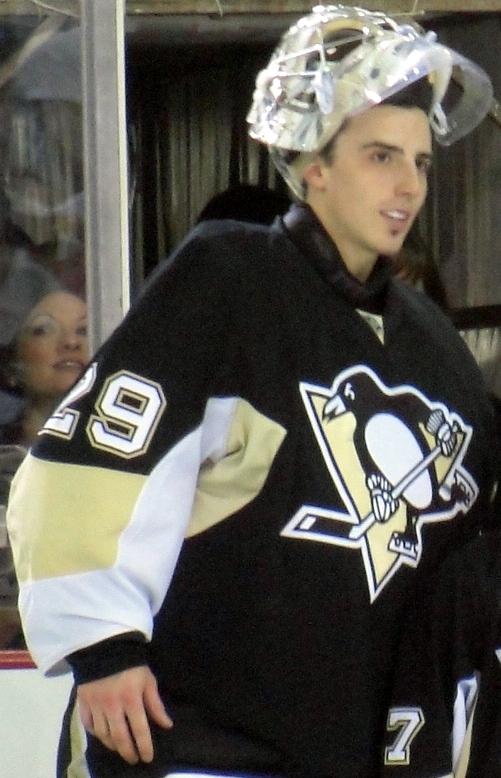
| Award | Year |
|---|---|
| QMJHL | |
| Mike Bossy Trophy | 2003 |
| Telus Defensive Player of the Year | 2003 |
| Second All-Star Team | 2003 |
| CHL/NHL Top Prospects Game | 2003 |
| CHL Third All-Star Team | 2003 |
| NHL | |
| Rookie of the Month | October 2003 |
| Stanley Cup champion | 2009, 2016, 2017 |
| All-Star Game | 2011, 2015, 2018, 2019, 2020 |
| All-Decade First Team | 2010s |
| NHL Fan Choice Award (Save of the Year) | 2019, 2020, 2021 |
| William M. Jennings Trophy | 2021 |
| Vezina Trophy | 2021 |
| Second All-Star Team | 2021 |
| Pittsburgh Penguins | |
| Aldege "Baz" Bastien Memorial Good Guy Award | 2009-10, 2011-12 |
| Team MVP | 2011 |
| IIHF | |
| WJC Top Goaltender | 2003 |
| WJC MVP | 2003 |